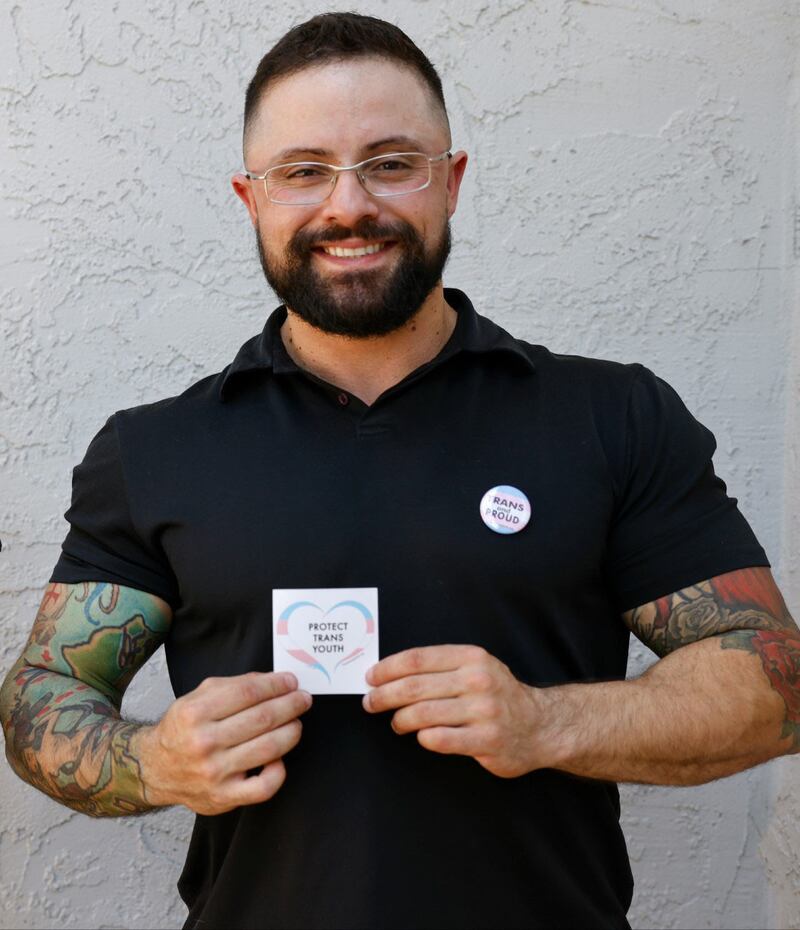The joy was audible in Paulo Batista’s voice. The 36-year-old from San Diego, California, wants to join the Navy. The significant obstacle that was former president Donald Trump’s ban on trans service people was now gone, revoked by an executive order issued by Joe Biden’s administration.
“I’m just ecstatic today. I feel like I am walking on clouds,” Batista told The Daily Beast. “It’s a new…”
He started laughing again, saying he had been with his “ecstatic, very supportive” colleagues at the property management company where he works when he heard the news. “I’m just speechless. Before, having the ban meant it felt like I was constantly fighting a back-and-forth battle. Lifting the ban means nothing is going to stop me.”
Batista had already called the navy recruiter he was working with to advance his application to join the service—where he hopes to work in the I.T. or communications field—without the shadow of the ban impeding him.
Hours earlier on Monday, Joe Biden and Defense Secretary Lloyd Austin had announced the immediate rescinding of Trump’s ban, which had gone into effect in April 2019, having originally been announced in a presidential tweet-storm in July 2017.
The ban now lifted means that new trans recruits, like Batista, can enlist; it also means those trans people who were already serving but without official diagnoses of gender dysphoria can do so not only openly but also with full access to transitional medical care. “This is the right thing to do. It is also the smart thing to do,” Austin said, lifting the ban.
Biden’s executive order also makes clear his intent to do right by anyone who has been treated unjustly under Trump’s ban; a summary of the executive order stated there would be “an immediate start to the identification and examination of the records of service members who have been involuntarily separated, discharged, or denied reenlistment or continuation of service on the basis of gender identity or under circumstances relating to gender identity, as well as the correction of the military records.”
Army Staff Sergeant Alleria Stanley, 47, is one of a group of trans service people—an estimated 1,600 in number—exempt from Trump’s ban, having received official diagnoses of gender dysphoria and having transitioned when the Obama administration had first lifted the ban in 2016.
“I feel elated, I feel excited, and I am absolutely joyful for all the transgender individuals who wanted to serve openly and have not been able to for the last several years,” Sgt. Stanley told The Daily Beast, making clear she was speaking in a personal capacity. “Finally, this weight has been lifted off us. We can all be authentic. For those who haven’t been able to come out of the closet—and I know so many of them—they can now come out.”

Army Staff Sergeant Alleria Stanley.
Courtesy Alleria Stanley.“For those of us who are out, and also for those living in secret, the ban gave voice and approval almost to anti-transgender sentiments throughout the military,” Sgt. Stanley said. “I liken it to the Trump administration saying, ‘Don’t worry, we’re not letting more in, and we’re getting the ones we already have in there out as fast as we can.’”
Sgt. Stanley, who is based at Fort Leonard Wood, Missouri, said she personally had experienced some of this prejudice, which was now under investigation and which she could not talk about. “However, I can say that the biggest response I got both before the ban and during the ban was people coming up and saying, ‘I’ve never served with anyone transgender before,’ and I would say, ‘Yes you have, you just didn’t know it.’”
While Trump’s ban was in place, even though she was exempt from its animus, Sgt. Stanley felt she could “not put a foot wrong. I felt very visible, highlighted, and representative of so many of those who were not able to come out. They had to lead two separate lives, flip-flopping between these two lives. It’s an incredible mental drain, having to be one gender at work and another at home, and having to go back and forth between the two. The stress of that is difficult to describe. It wears down your mental acuity and emotional strength, and by being able to serve authentically that goes away. You can be yourself.”
Paulo Batista said he had been “ecstatic” when Biden had picked Dr. Rachel Levine to be an assistant secretary of health. As Pennsylvania’s Secretary of Health, Dr. Levine had determinedly gotten on with her job in the face of relentless, transphobic attacks.
“Once I saw Biden do that, I knew revoking the trans ban was coming,” said Batista. “It’s a new day. Everything is going the way it should. It’s all meant to be.” He said he had been most moved today by messages of support from allies who were not LGBTQ, rebuking transphobic comment-makers online.

Paulo Batista.
Mike BlakeUp until now, said Batista, “it has felt like something was in the way. We were constantly fighting this fear that Trump had imposed on us. He gave wrong information. When you have the wrong knowledge, or given a lack of knowledge, there is always fear. It was like constantly fighting this invisible wall. But it was not going to stop me. I kept pushing. Even if Trump had won a second term, I was going to fight this all the way to the end. When Biden won, the clouds parted, sunlight came through. I thought, ‘OK, maybe there’s hope.’”
While the ban was in place, Sgt. Stanley said she experienced “a lot of depression, it was disheartening to see us take steps backward. You can’t go back into the closet, so you just worry, ‘What’s next?’”
Sgt. Stanley joined the service in 2003, motivated to do so by the events of 9/11. “I always wanted to serve, but life happens. September 11 refocused me. I knew I could not sit on the sidelines. I knew I had to serve, and I am proud to do so.”
She particularly denounced the spurious arguments that had been advanced against trans military service, such as the allegedly exorbitant cost of medical care when—in reality—trans medical care has cost the military less than one percent of its entire healthcare budget since 2016.
Sgt. Stanley had found that being out during the time of the ban had meant she had been seen by a lot of junior recruits as somebody who was approachable to talk through whatever issues they were having. That had shown her that “diversity means we have a stronger military.”
She was also touched by colleagues who, even before she had officially transitioned, used her preferred pronouns and correctly gendered her. “It was affirming and welcoming. It was like they were saying, ‘We know you’re here, and you’re welcome to be here with us.’”
Sgt. Stanley believes that it should be relatively easy to lift the ban in practical terms, as the armed forces had done it before in 2016. Its impact on serving trans people, and new recruits, would be considerable she said.
“By allowing people to serve openly and authentically we demonstrate how we are no different to anyone else who serves,” said Sgt. Stanley. “We are willing to be deployed, we hold positions of responsibility like command positions. We have been serving, and we’re very proud to serve.”
Lt. Col. Bree Fram, an active duty astronautical engineer in the U.S. Air Force and a spokesperson for the trans military advocacy organization Spart*a, told The Daily Beast that the “nervousness” of those trans service people who are not out would now hopefully disappear.
The organization’s members were “euphoric,” she said. The announcement provides the “perfect opportunity” for those who are not out because of Trump’s ban to come out, and prepare to avail themselves of the medical care they are now eligible for when the lifting of the ban becomes practical reality in the coming weeks and months.
“I am simply relieved and excited—and mostly excited—for the opportunity that others are going to have that I was given in 2016. The ability to be our best selves is a gift,” said Lt. Col. Fram. “It’s an amazing chance to be a better soldier, sailor, airman, marine, and coastguardsman. We really couldn’t ask for more. I am thrilled beyond belief for the opportunity for everyone to serve authentically, and be part of something bigger than they are. Those who couldn’t serve openly now have the opportunity to reach their full potential. We are excited and proud.”
There were still some “bureaucratic rough edges” to work through, said Lt. Col. Fram, primarily around the same kinds of medical care that trans and cisgender military employees both receive.
This reporter asked Sgt. Stanley how she felt about the prospect of a future, more conservative presidential administration seeking to reimpose the ban. It had, after all, become a political football since the first 2016 repeal.
“I can’t predict what a future administration would and would not do, but we do need to eliminate the possibility of another flip-flop,” Sgt. Stanley said. “It’s been maddening for those in service and for those who want to serve. We need the principle of open service to be taken up by Congress and enshrined in law, specifically when it comes to the Department of Defense.”
Whatever the anti-discrimination rules enshrined in the “Bostock” Supreme Court case, or the Biden executive order of last week, or a future Equality Act—should it ever pass—Sgt. Stanley says the DoD is “a different animal, and we need a federal law that says transgender service is authorized openly and without hesitation. We should not have to depend on an executive order, or a memorandum from the Defense Secretary.”
Still, the executive order issued today had ended four years of fear and nervousness, said Lt. Col. Fram.
“Serving for the last four years has been difficult for all trans service members,” she told The Daily Beast. “We have lived under a cloud, and been considered a burden by the U.S. government, no matter how welcoming our peers and commanders have been. It’s hard for anyone to deal with that social pressure, and the pressure to continually prove yourself, to be an example, certainly weighed people down.
“But trans people persevered. I’m unbelievably proud of the accomplishments trans people made, overcoming the challenges of the last four years. They have earned the respect of their comrades day in, day out. We relish this moment, and we look forward to a point in the future where thinking of the military without us is something people won’t do.”
Biden had originally said revoking the trans military ban was a “Day One” objective; on the actual “Day One” he signed the executive order ensuring the principle of outlawing anti-LGBTQ discrimination as enshrined in the ‘Bostock’ Supreme Court decision be abided to.
“Some people thought he was back-pedaling on lifting the ban,” said Paulo Batista. “But, to be honest, I didn’t think it was going to happen as fast as it has. And then, today!” Batista laughed loudly again. “Oh my god! The wall has gone. There is nothing stopping me now, apart from myself. At this point the world is limitless for me. Now it’s ‘Go’ time.”



